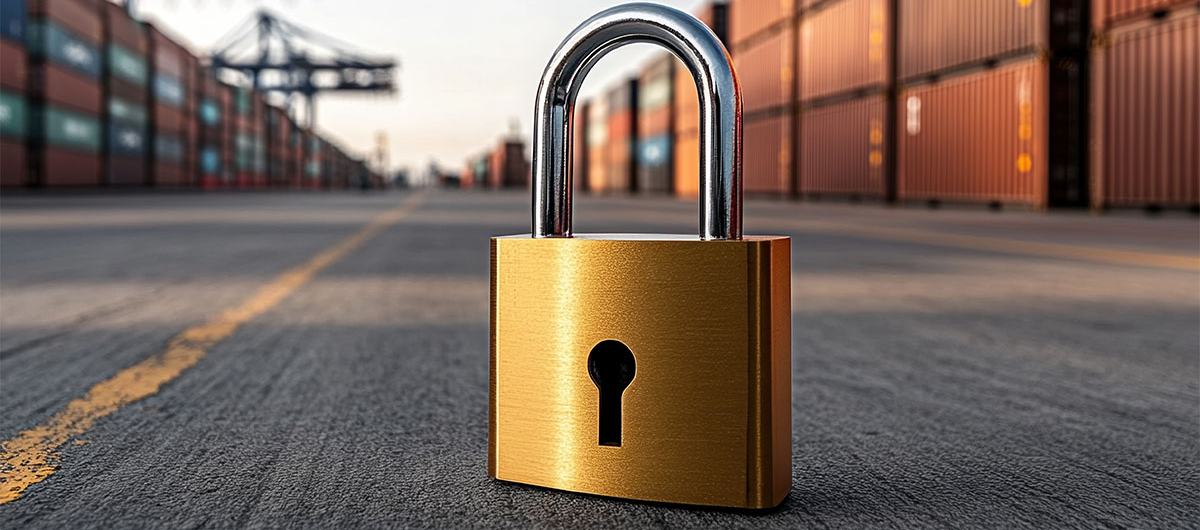Week in Review: Havoc on the Red Sea—Container Rates & Fears of Ripple Effects Soaring After Rebel Attacks

January 8, 2024
July 8, 2025
x min read

In our latest update, the Red Sea's escalating tension takes center stage—drastically changing the game for global shipping. Major players such as Maersk are indefinitely dodging the once-busy maritime highway, driven by the fear of Houthi rebel attacks, and the U.S. military is now getting involved.
Other shipping giants are following suit—but rerouting around Africa isn't just a detour; it's a massive shake-up in shipping routes, skyrocketing costs, and a potential hit to your wallet through rising prices. And that's not all—in this piece, we dive into how the International Maritime Organization is stepping up, too.
Beyond this, we’ll also discuss Mediterranean Shipping Company’s (MSC) rise as a maritime heavyweight, the launch of Europe's first sustainable reefer rail service, and the bizarre twist of 19,000 bottles of tequila vanishing into thin air. Stay tuned: this week’s edition is a wild ride.
Red Sea Crisis & Its Impact on Container Shipping
The Red Sea shipping crisis has escalated from recent Houthi rebel attacks. Maersk—the second-largest global ocean carrier—initially considered resuming Red Sea transits but is now indefinitely halting them and rerouting around Africa's Cape of Good Hope. Other carriers followed suit after a direct attack on the Maersk Hangzhou and further Houthi threats. In response, U.S. military action resulted in the destruction of three Houthi vessels and the loss of ten rebels. Still, unfortunately, we should brace for ripple effects on international trade and the global economy.
Container Shipping Rates Surge
With 12% of global shipping capacity rerouted due to the Red Sea crisis, container shipping rates are sharply rising—and could continue to do so. The Shanghai Containerized Freight Index (SCFI) spiked by 40%, hitting a peak not seen since October 2022. Long-haul routes between Asia and Europe are particularly affected, with spot rates more than doubling—and some soaring by over 200% since early December. Moreover, the Freightos Baltic Daily Index reflects these increases, with rates on the China-Mediterranean route jumping 80% in a single day (January 2, 2024).
Implications for Global Trade
The Red Sea crisis has far-reaching implications. Some immediate consequences include higher freight costs, longer delays, and increased liner costs due to longer voyages. Importers face the brunt of these developments via rapidly rising spot rates and surcharges. In addition, diverting shipping routes leads to increased fuel consumption and other expenses. At the same time, supply chain disruptions and inflation could surge, including food and beverage.
The International Maritime Organization's Stance & Actions on the Red Sea
In light of the turbulent situation for international shipping in the Red Sea, International Maritime Organization (IMO) Secretary-General Arsenio Dominguez has delivered a strong message of condemnation and reassurance.
Condemning Attacks & Ensuring Safety
During his address to the United Nations Security Council, Dominguez firmly condemned the attacks against commercial vessels in the Red Sea, and reiterated the IMO’s commitment to protect seafarers, ships, and cargo. Emphasizing the critical nature of this shipping lane—which handles roughly 15% of global trade—he stressed the need for unhindered maritime trade under international law.
IMO's Collaborative Efforts & Measures
The IMO remains vigilant, working closely with member states, industry partners, and navies to monitor the situation. Dominguez highlighted the proactive role of the Djibouti Code of Conduct (DCoC), particularly its recent meeting about the Red Sea area's increasing threats. In addition, the IMO is leading an EU-funded regional program for maritime security in the area, coordinating with INTERPOL, UNODC, IGAD, and other organizations to promote security standards across key regional nations. Dominguez also advised ships to continue reporting their movements in the Indian Ocean and when clearing the Suez Canal, aligning with Voluntary Reporting Area (VRA) guidelines.
Making Waves: MSC Now the World’s Most Extensive Shipping Line
In a significant shift in the global maritime industry, Mediterranean Shipping Company (MSC) overtook Maersk in 2023 to become the world's largest shipping line. This milestone was achieved through a substantial fleet expansion: over one million TEUs (Twenty-Foot Equivalent units).
Rapid Fleet Expansion
MSC's strategic acquisition of 14 "megamax" vessels—each with a 24,000-TEU capacity—and 26 neo-panamax ships ranging from 15,250 to 16,550 TEUs played a key role in this growth. This expansion brought MSC's fleet to 783 cellular vessels, totaling 5.6 million TEUs—a 22% growth from the previous year. In addition, the company has 122 vessels still on order, representing a further 1.47 million TEUs. In contrast, Maersk experienced a 2.7% fleet reduction, losing 112,500 TEUs in 2023.
Global Shipping Dynamics
This reshuffling at the top comes as Maersk and MSC end their 2M vessel-sharing alliance in January of 2025. While MSC focuses on expanding its fleet size, Maersk is pursuing an integrator strategy—ordering new vessels capable of operating on green fuels. MSC's growth represented 47.4% of the total global fleet expansion in 2023. The container fleet increased by 8.2%, adding 271 ships and 2.14 million TEUs. CMA CGM—the third-largest shipping line—grew by 5.5% and is poised to surpass Maersk, while Ocean Network Express (ONE) climbed to sixth place, overtaking Evergreen.
First Sustainable Reefer Rail Service in Europe Launches
In partnership with PSA BDP, PSA Italy has launched a trailblazing sustainable reefer rail service across Europe. This initiative stands out as a major leap forward in environmentally-friendly cargo transport, as the first of its kind in the region.
Launch of this Innovative Rail Service
This groundbreaking service—operating between Basel, Switzerland and the Port of Genoa, Italy—offers a sustainable cooling or freezing solution for transporting temperature-sensitive products. Launched on September 26, 2023, this service offers a groundbreaking way of merging sustainable practices with the efficiency of rail transport. The successful initial run, carrying vital pharmaceutical products, marks a shift from traditional road transport to a more environmentally-conscious rail solution.
Eco-Friendly & Efficient Operations
What sets this service apart are its substantial environmental benefits. A study by EcoTransIT World indicates that this switch from road to rail could slash carbon emissions by as much as 83% and cut energy consumption by nearly half. The rail service employs an innovative refrigeration method powered by a dynamo, which harnesses the energy produced by the train's movement. A battery pack further supports the system and maintains the correct temperature—even when the train is stationary. Beyond serving the pharmaceutical industry, this service opens new doors for other sectors that rely on temperature-controlled transportation, showcasing PSA's forward-thinking approach to offering sustainable cargo solutions.
Grinches Swipe 19K Bottles of Tequila from Distributor
Cargo theft is a year-round threat, but peak season raises the risk to even higher levels, as this next item illustrates. Founded in 2019, Daytoon Distributors—known for their commitment to crafting authentic tequila from Jalisco's finest blue agave—faced a major setback: the theft of 19,000 bottles of their new Hacienda Chactun Tequila.
Sudden Disappearance of a Promising Shipment
The shipment, en route to North Carolina, vanished after crossing the U.S./Mexico border around December 21, 2023. This heist wasn't just a loss of cargo; it was a blow to the launch of Daytoon's new tequila line, which had been eagerly anticipated in U.S. markets. The deception deepened with misleading updates from a non-existent truck driver—leading authorities to suspect the cargo was somewhere in California.
Determined to Overcome the Challenge
Despite this significant hurdle, Daytoon actively seeks alternative routes to ensure that its tequila reaches its fans. CEO Mark Milliken remains optimistic, aiming to roll out the Blanco tequila in January—and catch up with the reposado release by February. This unexpected twist in their journey hasn't dampened their spirits as they continue to champion the essence of authentic tequila.
Prepare for Logistics’ New Horizons
In this issue, we've explored the turbulent waters of the Red Sea crisis and its impact on global shipping, witnessed the rise of MSC as a maritime power, and explored innovative strides in sustainable transport. We've also discussed the peculiar case of a large-scale tequila heist, illustrating the unpredictable nature of logistics challenges. Needless to say, it’s clear 2024 is off to a chaotic, uncertain start—which is precisely where cutting-edge technology solutions from Tive come into play:
- Trackers: Revolutionize your shipment tracking with Tive's advanced Solo 5G trackers, offering real-time location and condition monitoring to ensure the security and integrity of your cargo.
- Tive Tag: Enhance perishable shipment protection with Tive Tag—an affordable and reusable paper-thin temperature logger—to verify that your goods have remained pristine throughout transit.
- Platform: Streamline your supply chain management with Tive's intuitive cloud platform, offering comprehensive visibility, analytics, and integration capabilities for seamless shipment tracking and monitoring.
- Industries: Tive caters to a diverse range of industries, ensuring tailored solutions for unique supply chain challenges—from perishables to high-value goods to transportation and logistics to pharmaceuticals…and beyond.
- 24/7 Live Monitoring team: This team is available to help ensure that your shipments are constantly watched over and managed—to guarantee timely and secure delivery.
Arm yourself with innovation: let Tive lead the way in transforming your supply chain operations. Embrace the future of logistics–get started with Tive today.


